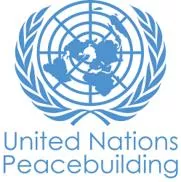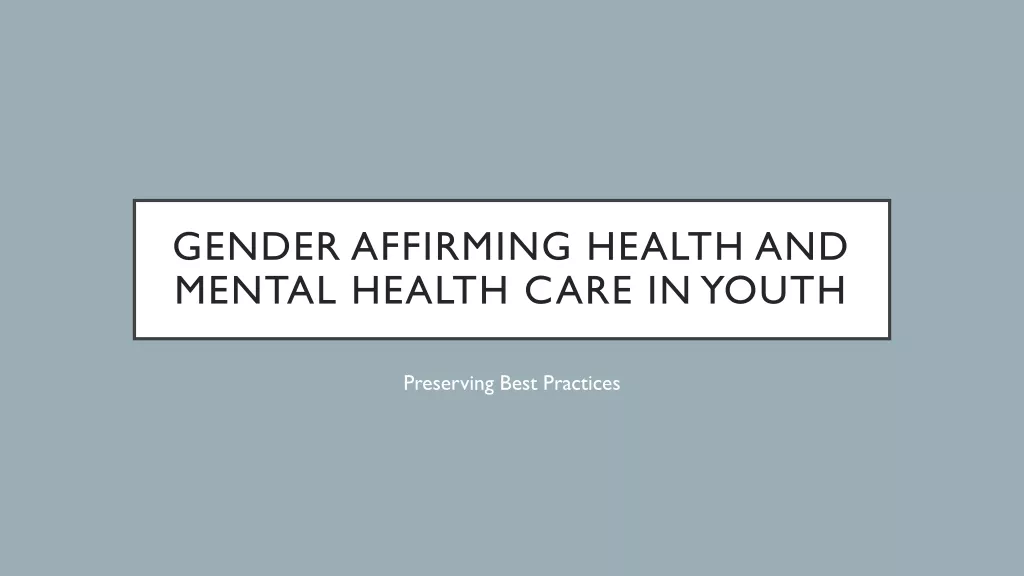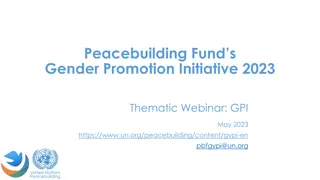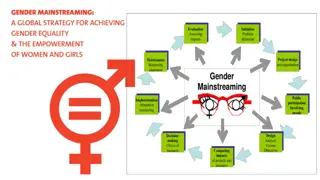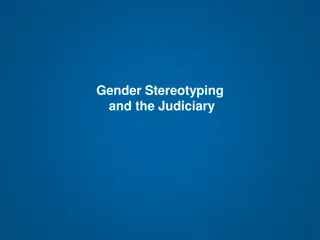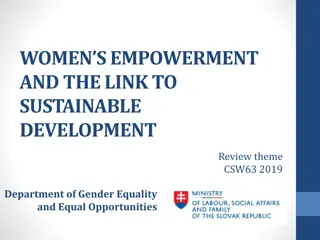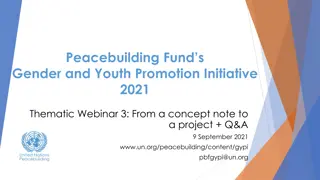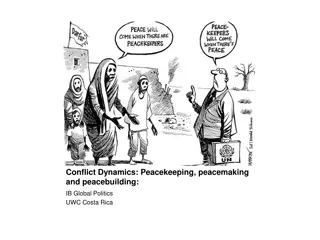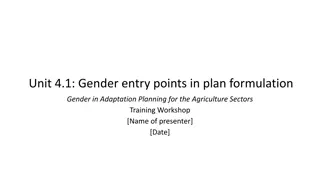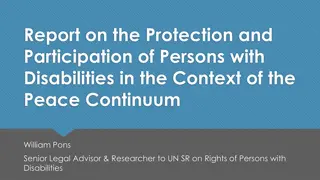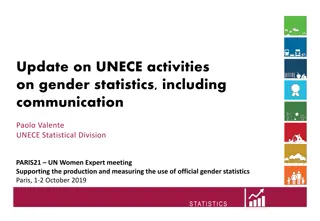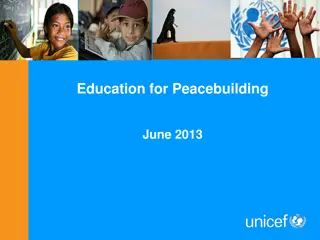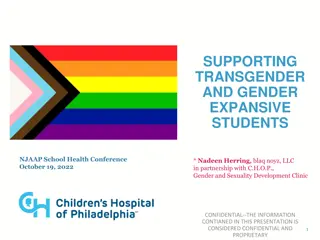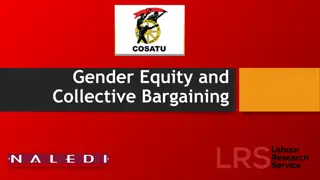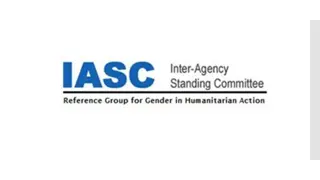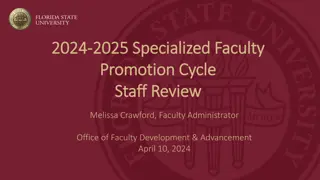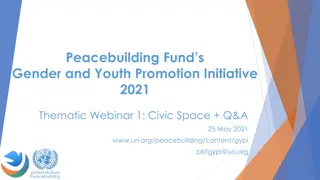Gender Promotion Initiative 2022 - Supporting Women's Peacebuilding Efforts
This initiative, launched by the Peacebuilding Fund (PBF), aims to strengthen women's civil society organizations for sustainable peacebuilding contributions. It focuses on promoting gender equality, supporting women in peacebuilding, and engaging women in decision-making processes. The thematic focus for 2022 emphasizes institutional capacity building and collaboration with grassroots women-led organizations. Project examples from Burundi, Sri Lanka, DRC, and Liptako-Gourma region showcase efforts to empower women as drivers of peace and conflict resolution. The upcoming deadline for concept note submissions is June 6th.
Download Presentation

Please find below an Image/Link to download the presentation.
The content on the website is provided AS IS for your information and personal use only. It may not be sold, licensed, or shared on other websites without obtaining consent from the author. Download presentation by click this link. If you encounter any issues during the download, it is possible that the publisher has removed the file from their server.
E N D
Presentation Transcript
Peacebuilding Funds Gender Promotion Initiative 2022 Webinar: GPI 2022 + Q&A May 2022 https://www.un.org/peacebuilding/content/gypi-en pbfgypi@un.org
Overview Gender Promotion Initiative 2022 Supporting institutional capacity Do no harm Engaging and co-designing project proposals with women s organizations Supporting and financing women s civil society organizations Q&A
Gender Promotion Initiative (GPI) In response to Security Council resolutions 1325 (2000) and subsequent resolutions on Women, Peace and Security, the Peacebuilding Fund (PBF) launched its first Gender Promotion Initiative in 2011 Aims to support innovative approaches that promote gender equality and support women in peacebuilding 2021: Project list available here The recordings and slides from the introductory webinars (including information on eligibility) are available here .
Thematic Focus GPI This year's GPI will focus on: Supporting women s civil society organizations, groups and networks in strengthening their institutional capacity for sustainable contribution to peacebuilding Need to reach all criteria for PBF Gender Marker 3 Required to be both gender- and age sensitive At least 40% to be allocated to national or local civil society partners, in particular women- led organizations In addition, preference will be given to: Joint UN-CSO projects, projects implemented by national CSOs and projects that demonstrate strong partnerships with women-led organizations. To reach organizations working on the front lines of crises, innovative and trust-filled intermediary models, such as larger organizations acting as intermediaries are encouraged. Reminder: deadline for submitting concept notes is June 6th
Project examples Burundi, UN Women & AFSC: Strengthening the Women s Mediator Network The network has handled more than 25,000 community-based conflicts and building on the achievements, this project is working to expand the peacebuilding impact by supporting its efforts in institution development. Sri Lanka, SFCG: Young Women as Drivers of Peace: Providing 360 Support to Emerging Women Leaders women leaders by putting the power to determine resource allocation and define success metrics in their hands, included a tailored mentorship and small grants program. Support emerging DRC, Fund for Congolese Women: Promoting Women s Participation in Peacebuilding through Peace Huts Women-led organisation that support other grassroots women-led organizations in working through peace huts to resolve local conflicts Liptako-Gourma region, Mercy Corps: Appui aux Initiatives Locales de promotion de la Paix Example of a project that includes a small grants facility to support local organisations.
Supporting institutional capacity The 2021 PBSO s Thematic Review on Gender-Responsive Peacebuilding confirmed that many women peacebuilders emphasize the need for more sustained capacity building support Including in technical areas as financial management, grant writing, and monitoring and evaluation Responding to this recommendation, the GPI seeks proposals supporting women s civil society organizations, groups and networks to build their institutional capacity to undertake peacebuilding actions in a sustainable manner This can for example include: engaging in stakeholder mapping supporting organizations with bottom-up needs assessments supporting in filling identified capacity gaps and working through small grants facilities
Protection and do no harm Women peacebuilder and human rights defenders can face exclusion, marginalization, discrimination and violence due to their work. Those facing multiple intersecting forms of marginalization face particular risks Diverse types of protection may be needed In order to achieve peace, it is essential that women peacebuilders and organizations have the opportunity to promote their work without fear of threats or reprisals Consider and prevent the risk of of further exposing women peacebuilders and their organisations and the risk of them facing potential backlash due to the work Do no harm and consider aspects around protection
Gender Marker 3 Gender Marker 3 The principle purpose of the project is to advance gender equality and women s empowerment (GEWE) in the context of peacebuilding. Gender equality is fundamental to the project design and the expected results. 80-100% of budget to GEWE More information available in PBF Gender Marker Guidance here
Lessons learned Main reasons for concept notes not being selected in 2021: 1. Link to peacebuilding: Successful proposals were able to clearly articulate the link between the proposed interventions and the intended peacebuilding outcome 1. Gender / youth responsiveness: Successful concept notes placed this at the center of their proposal Gender does not equate women, but it is about the diversity of femininities and masculinities, power relations, attitudes, behaviors, norms and roles. Avoid stereotyping Focus on agency 2. Innovation: Successful concept notes articulated how and why their proposal was innovative
Engaging and co-designing project proposals with women s organizations Critical to switch approaches: approach women s organizations not as beneficiaries or implementing entities, but as true partners When to engage with women and women s organizations? Conflict analysis Priority setting Project design Budget distribution Project implementation Monitoring/reporting/evaluation How to engage with women s organizations? Transparent process to select core partner organization Identify key women peacebuilders and women s organizations to be engaged throughout the project Ensure diversity of representation Focus on meaningful participation Ensure a Do no harm approach Support effective women-led initiatives
Typical pitfalls in engagement Women are only considered beneficiaries and stakeholders, not actors and leaders Women are consulted too late in the process Only well-established women s organizations are invited for a consultation or partnership Lumping women and youth together, treating them as homogeneous groups Generalizing statements around young men as perpetrators of violence and young women as passive victims
Beyond consultation: 10 principles for meaningful participation Beyond Consultations tool (2019), GAPS, Women for Women International, Amnesty International UK, Saferworld and Womankind Worldwide
How to meaningfully support women peacebuilders? Local ownership Authentic partnership Sustainability
Local Ownership Co-creation: ensure that all partners co-determine the direction of the project; Bring in beneficiaries: provide flexibility to beneficiaries from the very early stages; Participatory grantmaking: adapt participatory resource allocation strategies (esp. small grants); and Plan ahead: encourage joint programming (but be mindful of time and resources).
Authentic partnerships A shift from a narrative of risk to one that is based on trust in practice: Designing and managing participatory resource allocation processes, promoting flexible financing instruments and modalities; Conducting capacity-building needs assessments and then helping local organisations meet those needs; Supporting adaptive monitoring and evaluation processes, including community-led determination of impact and encouraging clear and realistic goals; Facilitating access to global, regional and cross-border expertise for local organisations; and Prioritising long-term, trusting partnerships, rather than short-term collaborations between INGOs and local organisations for a specific grant process.
Sustainability Utilise the catalytic role of the Fund; Practice support that leads to broader sustainability (i.e., partnering with existing local and community structures); Prioritise institutional capacity, including enhancing resources, skills and capacity to collect data and analyse results; and Focus on bringing on board diverse partners.

 undefined
undefined

